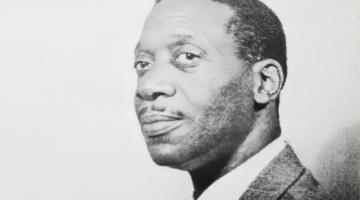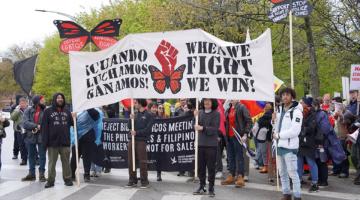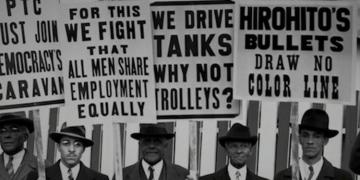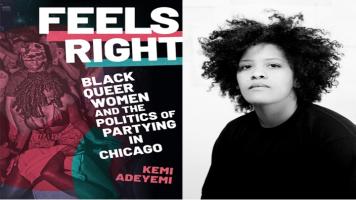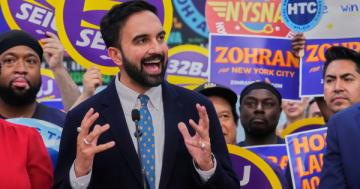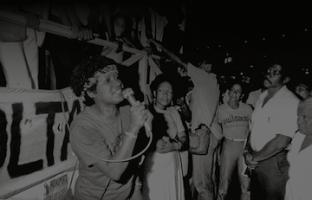An inspiring interview with Sylvia Woods highlights the role of Black women in labor organizing and demonstrates that Black women should always be at the forefront.
Black women have always taken the forefront. Thus spoke Sylvia Woods (15 March 1909 - 4 February 1987) in a 1974 interview in African Agenda. Woods was a Chicago-based union organizer, community activist, and Black Communist. Born in New Orleans, the child of working-class, Garveyite parents, Woods moved to Chicago in 1929 with her husband, Henry. She worked in laundries before finding employment with Bendix Aviation on the eve of World War II. Woods was a union member and organizer at both sites; she helped organize the Laundry Workers Union and became an active member of Bendex Local 330 of the United Automobile Workers. Woods later became a licensed practical nurse and worked at Chicago’s public Cook County Hospital for over a decade. She was involved in the struggles to keep Cook County open and, as a long-term resident of Chicago’s West Side, was a well-known community activist, becoming in 1946 the first Black woman to run for the Illinois General Assembly. Woods was also a founder of the Angela Davis Defense Committee and the National Alliance Against Political Repression, alongside Charlene Mitchell and others.
In the African Agenda interview, Woods recounts some of her history as an organizer and activist. She emphasizes the general importance of unions in fighting for work-place rights – but also the particular role that Black women have played in labor struggles. Black women have always taken the forefront, Woods states and she points to many of the Black women who were inspirations for her own work: Miranda Smith, the North Carolina-based leader of the Food, Tobacco and Allied Workers. Alma Settles and a woman whom Woods only names as Othelia who organized together at the Chicago plant of automotive parts manufacturer Maremont. Ruby Mabry of the Illinois Welfare Rights Organization. Woods' own mother. And other “small women who worked and organized and had the children, had to go home to supper, come back to the union meeting, do the washing, the ironing and the cooking.” Woods also gives a hat tip to those “good men,” including her father and husband, who provided quiet and steady support in the background.
On the anniversary of her birth, we reproduce the African Agenda’s “A Talk with Sylvia Woods” below. It is a wonderful and inspiring interview of an incredible Black woman whose example should always be at the forefront.
A Talk with Sylvia Woods
Sylvia Woods is a staunch Black woman who has a long history of struggle in the trade union, Black liberation and defense movements. She led the midwest campaign to free Angela Davis and now serves as the Coordinator of the Chicago Area Committee to Defend Political Prisoners. She is a mother, a worker, a housewife, and a dynamic member of the Communist Party of the USA. The African Agenda staff interviewed Sylvia to get her perspective of the role of Black women in the movement in the 20th century. The following article is the content of that interview.
I first became conscious of the trade union movement and the liberation struggle when I was about 11 or 12 years old. My father was a Garveyite. He also was a trade unionist, a roofer, but he belonged to an auxiliary union. There were the white trade unions and the black trade unions; the black unions were called auxiliaries. My father was a staunch trade union man who told me that no matter how bad a union was, it was better than nothing and if there was ever a chance for me to join a union, I should.
I remember in the South, women had special problems. My mother had let my little brother sell newspapers and he went to sell newspapers down by the railroad station. He became tired and he was sick. So he sat down near a white restaurant and this man came out, and wanted to know what was this little “nigger” sitting out here for and my brother said, “I don’t feel well. As soon as my stomach stops hiring me, I’m gonna leave.” This man kicked him. My brother came home and told my mother. My mother went down to that restaurant and walked straight into this all-white restaurant and said, "Who owns this God-damned place!" The guy said, "I'm the manager here, what do you want?!" She said, "Well, some S.O.B . came out of this place and kicked my child and I'm gonna wreck this place if it isn't rectified." The manager walked around the place and asked who kicked this little "nigger" who was sitting outside. The man who did it stood up, and my mother said, "You're going to jail this night or to Hell, either one. You don't go around kicking my son."
I'm saying this to say that my father could not have done this. But she was so angry that she just didn't care and she went. And, the guy went to jail. Black women have always taken the forefront. And my father didn't feel bad about it. He knew that he could not have done it. No matter how angry he was. They would've killed him and thought nothing of it. He didn't feel that she was acting the man. He felt that she was doing something that he could not do at the moment.
Then I came to Chicago looking for a job. I went to the steam laundry to try and get hired. The guy wouldn't hire me because they were only hiring experienced people. This was the height of the depression and where was I going to get the experience? I think I was all of 16 years old. I had already been married a year. I kept going back every day until he finally hired me. I worked there for about two years and every one was black.
One day, they decided that they wanted to have a floorlady. They only had a real old foreman and he had to run all over the place. When he would leave, of course, we would stop working and cut the machines off and rest, because it was a 10 hour day and grueling work. The night they said they were going to hire a floor lady, we thought, well this is good, one of the black women will become the floorlady. But they brought somebody in from the outside, a white woman to be our floorlady. So I said to everybody, "This is wrong. We should not let her be the floorlady. We've worked here three and four years and to let her come in, this would not be right." We decided that we weren't going to put up with her being floorlady. I didn’t know how to go about organizing people. Sit down strikes were just beginning, so I said, “We’ll just stop; we just won’t work. Stay here and we’ll tell him he has to get rid of this woman. What he did was go and get the police to come and throw us out of the place. We fought with the police, and we tore up the laundry. But they succeeded in throwing us out. I didn't know what else to do after that so everybody came to my house and we had a big party. In the morning everybody went home and went out looking for other jobs, because we didn't know what was the next step to take.
So I went to work in another laundry where they then began to organize the laundry workers, and I worked in that struggle and we organized most of the laundries.
I worked in a laundry until the war started, then I went into a war plant. This is where I really learned to organize. The shop I worked in was an unorganized shop. I worked in organizing that shop and was elected Financial Secretary Treasurer of the Bendix Local 330 of the United Automobile Workers. I was elected with 25% of the workers there black and the rest white. I never lost an election. The plant closed down after the war. That was my introduction to the trade union movement and to my ability to organize.
I could tell you about some of these wonderful black women organizers that I met. And I think I'd like to talk about the very first one whose name was Miranda Smith . She worked in Durham, North Carolina with the tobacco workers. In the tobacco industry, it was so segregated that when these people decided to go out on strike under Miranda Smith's leadership, they decided that the blacks and the whites couldn't even picket together. So they decided that the blacks would picket on one side of the street and the whites would picket on the other. Miranda became nationally known; in fact, when she died, Paul Robeson flew all the way from New York to sing at her funeral. She was well loved by both blacks and whites, and she integrated that local. She got them to work together and then next time they went out on strike, they did not march separately. She was really my idol.
I want to tell you about the small women who worked and organized and had the children, had to go home to supper, come back to the union meeting, do the washing, the ironing and the cooking. And they weren't daunted by it; they just did it.
One such woman was Othelia who was working with another woman named Alma Settles. Othelia was working in one of the Maremont shops, AF of L had it and it was just a company union. The workers looked up to her even then. Even this rotten AF of L leadership respected her. When she had a grievance, they would settle her grievance. UAW went in to organize that shop and they went to Othelia and showed her the difference in the unions. That woman could call a meeting with just a few hours notice and you wouldn't be able to get into the hall. She was next to Miranda Smith in my estimation. She was good at organizing. She had the foresight to do things on a scale that people understood, and people would move, even the backward whites would move for her.
She and Alma Settles formed a team, Alma didn't have any children but Othelia had eight children. Whenever there was anything going on, she never left out her husband. She would say, "I want you to know that I'm here tonight because of my husband and I want him to stand up; I want you to see my husband." She had a good husband who helped her with the children.
These good men, we have them. These Black men who've gone through so much and are still willing to help their wives. There are some, of course, who are jealous, but then the women learn how to handle this, and still go on to do their work without wrecking the marriage.
Organizations that have been born since the second World War like the civil rights organizations and the Welfare Rights Organization, have developed Black women like Ruby Mabry. Women like Ruby Mabry who were coming along at that time didn't know about organization and how to organize. But when it became necessary to have an organization for welfare mothers, these women came up and they learned and they did. And this is something that is beautiful and different. This has been the great change. Wherever there’s any kind of movement, Black women come up from the ranks like they were born knowing how to organize. And they get in there and do such a beautiful job. The other thing that I glorify is these young Black women with these college educations who are not going off like we used to do. This is a big change. You know, you used to grow up to get an education to try to get away from where you came from. But these women are coming back to where they came from. They're teaching that our college education and our knowledge belongs in the ghetto and we're gonna come back to the ghetto; in fact, we're never gonna leave it. Black women should make it their business to see that our children get a Black education. That and the fight to make the schools what they should be.
In the trade union movement, there's definitely a lot of work to be done. I don't think there's a woman on the Executive Board of the AFL-CIO. There's no Black women in the top leadership of the UAW. It's supposed to be the most progressive labor union. They certainly don't fight for women's rights in the shops like they should.
Black women have to struggle first on things that are nearest to the people; things that they need. I don't think that there is any mother who isn't interested in seeing that her child gets a decent education. And this can be struggled around. You can struggle, certainly, around day nurseries. Our people are not lazy. If a mother could find that she could go to work and make a decent salary, that she would be able to take care of her children, then she would.
Certain things hit certain people at certain times. It's hard; organizing is one of the hardest, most thankless jobs. But you keep on plugging. Nothing is ever lost. Never give up , knowing that this is a part of the struggle. Because it's planned that workers should be as tired as they can be so that all they have enough nerve for is to go home and try to get up and go back to work tomorrow. If you're dedicated, you've got to be in there plugging. And it's not easy.
African American Solidarity Committee, “A Talk with Sylvia Woods,” African Agenda, 3 no. 2 (February & March, 1974). Source: Chicago Anti-Apartheid Movement Collection, Columbia College Chicago.
Sylvia Woods commentary is expanded in the excellent documentary, Union Maids and in the anthology Rank and File: Personal Histories by Working-Class Organizers, edited by Alice Lynd and the late Staughton Lynd.




